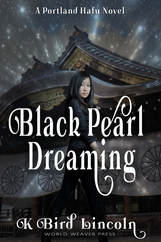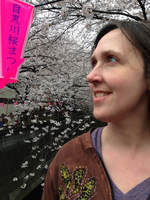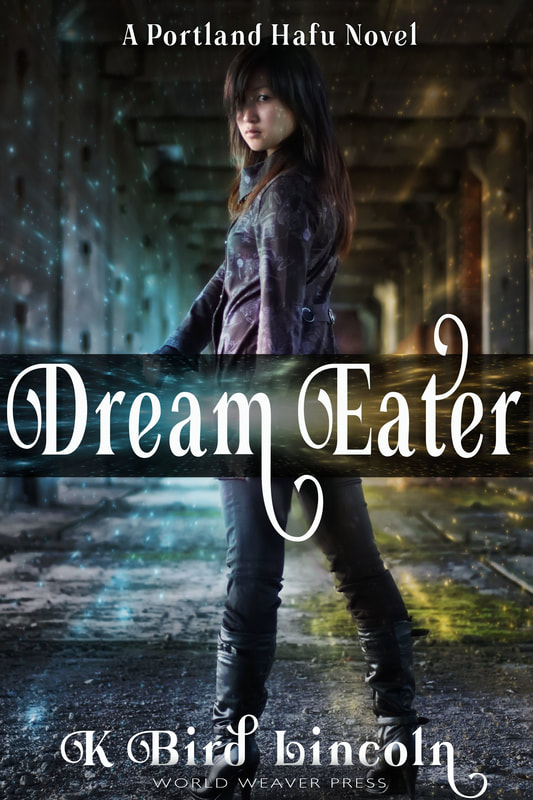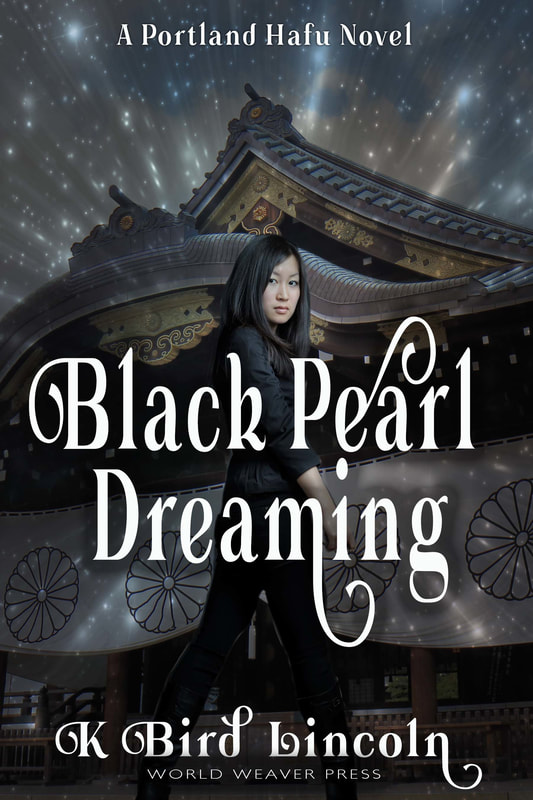 Guest Post by K. Bird Lincoln Hold on to your hats, folks, I’m about to get political. In high school and college I was politically active. But as I grew older, and had to, you know, live next to people and volunteer at school with people and basically maintain friendships outside of college I stopped talking about my beliefs. Discretion was the better part of valor. Far better to maintain cordiality than risk upsetting my carefully woven web of interdependence with other parents, co-workers, and friends. But then the last couple years happened in the U.S. and I realized that my very silence, my reticence to discuss difficult topics, contributed to the current political climate where immigration and international policies have become problematic. But how is a white, middle class fantasy-obsessed female nerd supposed to write about global relations when her brain is full of trickster Kitsune, romance, ancient dragons, and artisanal chocolate? Dream Eater, the first in the Portland Hafu series, was an attempt to bring multi-culturalism in the form of Japanese and First People’s myths into Urban Fantasy. I wanted my own daughters to see more multi-racial heroines like themselves in the genre I loved best. Crazy, Rich Asians and To All the Boys I Loved Before highlighted multi-cultural Asians in mainstream romance and YA. They made me ecstatic, to my daughters’ embarrassment. In Black Pearl Dreaming, my trio of main characters go to Tokyo to find answers about Koi’s Baku heritage and her father’s dementia. Instead of answers, Koi gets tangled up in the lingering hurts and aftereffects of World War II. Both Japan’s colonialism and the U.S.’s ignorant use of the Atomic Bomb figure into the plot. Japan invaded Manchuria in 1931. America dropped the bomb on Hiroshima in 1945. The soldiers and civilians who were alive to experience, and thus remember those atrocities, are nearing the end of their natural lifespan. We, as a global community, must not forget the lessons we learned about the value of human life from Auschwitz nor Minidoka. I purposefully wrote in references to Japan’s treatment of Koreans and Chinese as well as a graphic description of the aftermath of the Hiroshima Bombing from the perspective of an eyewitness. And in the third book of the Portland Hafu: The Last Dream of Her Mortal Soul, which I am editing now, Koi and her boys return home to Portland to face political conflict containing echoes of World War II racism. Don’t get me wrong. There is chocolate, coffee, and more magical creatures from Japanese mythology in Black Pearl Dreaming. Its entertainment. But I no longer feel I can create stories for the world that don’t include overt reference to the undeniable interwoven interdependence of our globalizing world. For better or for worse, technology means we are bound to each other, even across oceans. And in Black Pearl Dreaming, Koi finds out how much hate and racism in the past still hurt those she loves today. About the Author  K. Bird Lincoln is an ESL professional and writer living on the windswept Minnesota Prairie with family and a huge addiction to frou-frou coffee. Also dark chocolate-- without which, the world is a howling void. Originally from Cleveland, she has spent more years living on the edges of the Pacific Ocean than in the Midwest. Her speculative short stories are published in various online & paper publications such as Strange Horizons. Her medieval Japanese fantasy series, Tiger Lily, is available from Amazon. World Weaver Press released Dream Eater, the first novel in an exciting, multi-cultural Urban Fantasy trilogy set in Portland and Japan, in 2017. She also writes tasty speculative fiction reviews on Amazon and Goodreads. Check her out on Facebook, join her newsletter for chocolate and free stories, or stalk her online at kblincoln.com
1 Comment
Ruth
10/19/2018 02:45:35 pm
Your thoughts about multiculturalism and effects of war are eloquently stated. I wish they were not bound up just in fantasy stories read by a select audience. I’m wondering if those who discount this genre as serious writing, wouldn’t benefit from hearing these ideas in a broader context. Perhaps, letters to editor, or article in a journal or other social media.
Reply
Your comment will be posted after it is approved.
Leave a Reply. |
World Weaver PressPublishing fantasy, paranormal, and science fiction. Archives
February 2024
|
- Home
-
Books
-
All Books
>
- Beyond the Glass Slipper
- Bite Somebody
- Bite Somebody Else
- Black Pearl Dreaming
- Cassandra Complex
- Causality Loop
- Clockwork, Curses, and Coal
- Continuum
- Corvidae
- Cursed: Wickedly Fun Stories
- Dream Eater
- Equus
- Fae
- Falling of the Moon
- Far Orbit
- Far Orbit Apogee
- Fractured Days
- Frozen Fairy Tales
- Glass and Gardens: Solarpunk Summers
- Glass and Gardens: Solarpunk Winters
- Grandmother Paradox
- Grimm, Grit, and Gasoline
- Haunted Housewives
- Heir to the Lamp
- He Sees You When He's Creepin': Tales of Krampus
- Into the Moonless Night
- Jack Jetstark's Intergalactic Freakshow
- King of Ash and Bones (ebook)
- Krampusnacht
- Last Dream of Her Mortal Soul
- Meddlers of Moonshine
- Mothers of Enchantment
- Mrs Claus
- Multispecies Cities
- Murder in the Generative Kitchen
- Recognize Fascism
- Scarecrow
- Sirens
- Shards of History
- Shattered Fates
- Skull and Pestle
- Solarpunk (Translation)
- Solarpunk Creatures
- Solomon's Bell
- SonofaWitch!
- Speculative Story Bites
- Trenchcoats, Towers, and Trolls
- Weredog Whisperer
- Wolves and Witches
- Anthologies and Collections
- Novels
- Novellas
- Fairy Tale
- Fantasy
- Romance
- Science Fiction
- Urban/Contemporary Fantasy
- Young Adult SFF
-
All Books
>
- Blog
- About
- Contact
- Press / Publicity
- Newsletter Signup
- Privacy Policy
- Store



 RSS Feed
RSS Feed